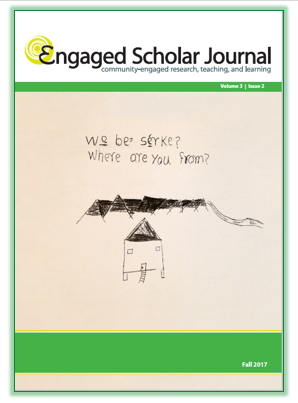How are Educational Researchers Interacting with End-users to Increase Impact?
DOI:
https://doi.org/10.15402/esj.v3i2.335Keywords:
research impact, research evaluation, engaged scholarship, knowledge mobilizationAbstract
There has been increased interest in how researchers might collaborate with end users to increase the impact of their work. In Canada, efforts to extend research impact beyond academia are called knowledge mobilization (KMb). This study surveyed SSHRC- funded educational researchers to assess their KMb efforts in relation to three areas: stakeholder engagement (target audience and frequency of interaction), dissemination mechanisms (intermediaries, networks, media, online tools), and research impact (research-related, service/practice, policy, societal). Findings: 70% of researchers reported regularly interacting with target audiences. Types of interactions included getting to know target audiences (71%), discussing research results (65%), and dedicating resources for capacity building (45%). Researchers reported impacts in relation to research (76%), service/practice (67%), and policy (35%), and societal impacts (35%). Researchers felt very well prepared to create plain language summaries of their work (54%), and collaborate with stakeholders (45%), but much less prepared to deal with media (32%), work with intermediaries (22%), or use technology to disseminate their work (16%). Implications for engaged scholarship are articulated in five areas: prioritization and co-production; packaging and push; facilitating pull; exchange; and improving climate for research use by building demand.
Downloads
Published
How to Cite
Issue
Section
License
Authors who publish with this journal agree to the following terms:
- Authors retain copyright and grant the journal right of first publication with the work simultaneously licensed under a Creative Commons Attribution License CC BY 4.0 that allows others to share the work with an acknowledgement of the work's authorship and initial publication in this journal.
- Authors are able to enter separate, additional contractual agreements for the non-exclusive distribution of the journal's published version of the work (e.g., post it to an institutional repository or publish it in a book), with an acknowledgement of its initial publication in this journal.
- Authors are permitted to post their work online (e.g., in an institutional repository or on their website) after the publication of their work in the Engaged Scholar Journal.
- Please note that while every opportunity will be taken to ensure author participation in the editing process, due to time constraints final copyediting changes may be made before publication to ensure APA adherence throughout all submissions.




